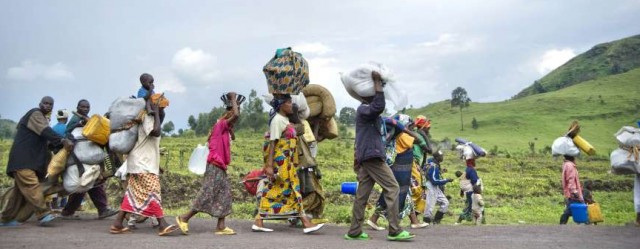Home > What We Do > Protection
Protection

A Safety Net
Governments normally guarantee the basic human rights and physical security of their citizens. But when people become refugees this safety net disappears. Refugees fleeing war or persecution are often in a very vulnerable situation. They have no protection from their own state - indeed it is often their own government that is threatening to persecute them. If other countries do not let them in, and do not protect and help them once they are in, then they may be condemning them to an intolerable situation where their basic rights, security and, in some cases their lives, are in danger.
The protection of 33.9 million uprooted or stateless people is the core mandate of UNHCR. The agency does this in several ways: it ensures the basic human rights of uprooted or stateless people in their countries of asylum or habitual residence end that refugees will not be returned involuntarily to a country where they could face persecution. Longer term, the organization helps refugees find appropriate durable solutions to their plight, by repatriating voluntarily to their homeland, integrating in countries of asylum or resettling in third countries.
In many countries, UNHCR staff work alongside other partners in a variety of locations ranging from capital cities to remote camps and border areas. They attempt to promote or provide legal and physical protection, and minimize the threat of violence - including sexual assault - which many refugees are subject to, even in countries of asylum. They also seek to provide at least a minimum of shelter, food, water and medical care in the immediate aftermath of any refugee exodus, while taking into account the specific needs of women, children, the elderly and the disabled.
High Commissioner's Dialogue on Protection Challenges
The eighth High Commissioner's Dialogue on Protection Challenges will take place on 16 and 17 December 2015 on the theme of "Understanding and addressing root causes of displacement".
Legal Protection
By working with governments and other organizations on subjects ranging from promoting asylum systems to refugee advocacy, UNHCR promotes the legal protection of refugees and durable solutions.
Operations
UNHCR has developed a network of suppliers, specialists and partners to protect civilians.
International Migration
The link between movements of refugees and broader migration attracts growing attention.
Strengthening Protection Capacity
Tools and strategies to strengthen the capacity of states to receive and protect refugees. This project is now active across five continents.
Refugee Status Determination
Answers to Frequently Asked Questions on UNHCR's Refugee Status Determination activities.
EU Asylum Law and Policy
EU law and practice affects creation of refugee protection mechanisms in other countries.
Safe from the Start
Conflict and displacement makes people of concern to UNHCR more vulnerable to abuse, including rape, domestic violence, sexual exploitation, survival sex and forced marriage.
 Notes on International Protection
Notes on International Protection
UNHCR's annual reporting to ExCom and the General Assembly on international protection developments.
- Note on international protection, Executive Committee, 64th session
- Note on international protection, Executive Committee, 63rd session
- Note on international protection, Executive Committee, 62nd session
- Note on international protection: Addendum - Note on statelessness, Executive Committee, 62nd session
- Note on International Protection, Executive Committee, 61st session